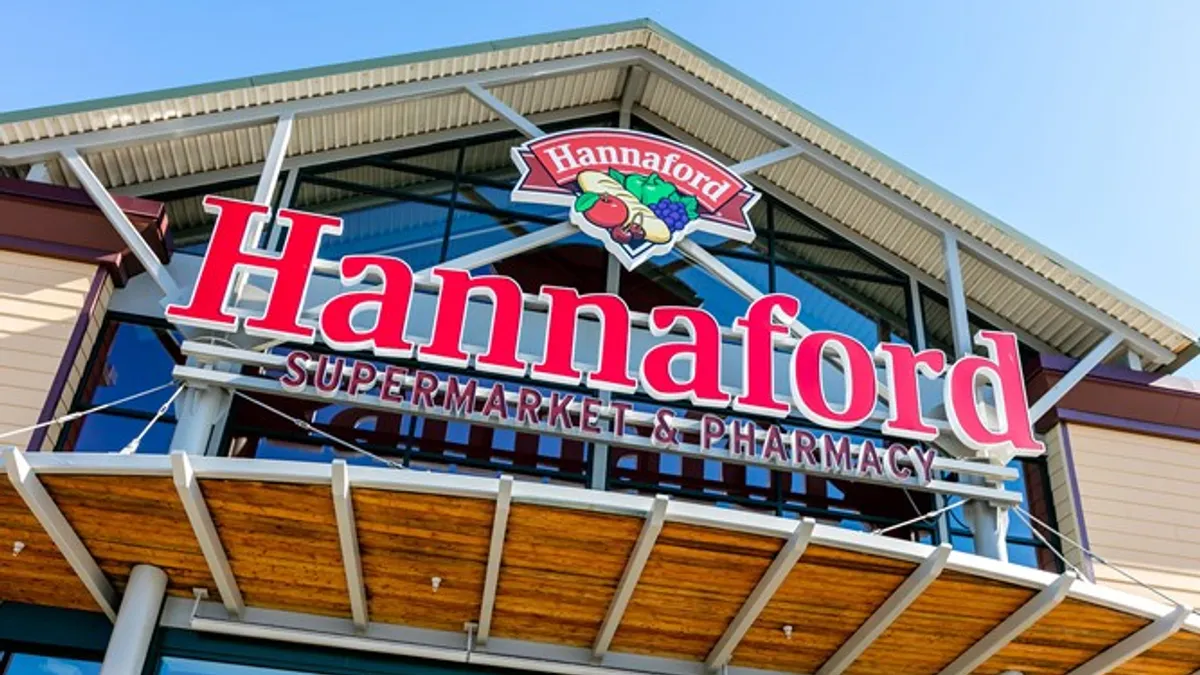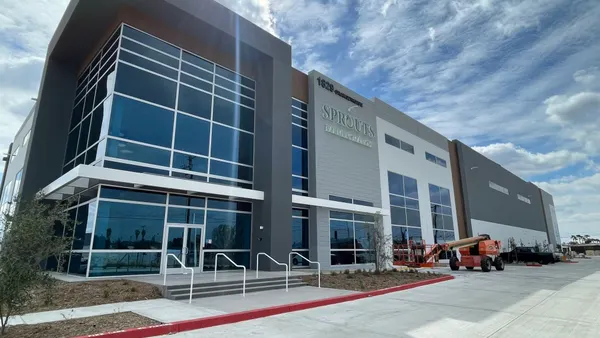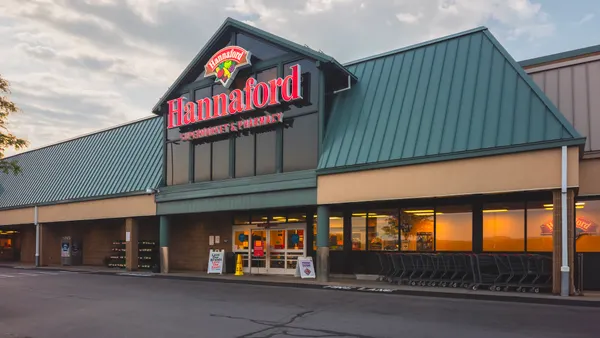Dive Brief:
- Hannaford last week responded to calls from Migrant Justice, a nonprofit, farmworker-driven human rights organization to improve its dairy supply chain.
- The activist group has called on the grocery chain to address “widespread labor abuses in its dairy supply chain” by joining its Milk with Dignity Program and held protests outside a Hannaford location in South Burlington, Vermont, last October.
- Hannaford said it supports the “fair, safe and humane treatment of agricultural workers” and disagrees with Migrant Justice’s approach to addressing issues facing migrant farm workers.
Dive Insight:
Hannaford has been under fire by Migrant Justice before and its latest response continues its reluctance to sign on to the activist group’s program.
Migrant Justice has claimed that Hannaford is “trying to sweep under the rug the human rights violations happening on farms in its dairy supply chain,” alleging that workers have submitted complaints about “a violent attack from a supervisor, housing unfit for human habitation, workplace injuries that have gone untreated, grueling schedules without breaks, and unjust firings in retaliation for speaking up.”
Migrant Justice claims that farmworkers for years have called on Hannaford to join its Milk with Dignity Program. Over the past year, workers on 10 farms submitted complaints about abuse and mistreatment to Hannaford’s hotline for workers in its supply chain, which was created in 2021 and stemmed from pressure by farmworkers to address working conditions, according to Migrant Justice.
Hannaford said that it does not think Migrant Justice’s solution is the right approach to tackle the issues facing agricultural workers, which it said “are systemic, complex and extend far beyond Hannaford’s supply chain and the state of Vermont,” and instead supports industry-wide changes made at scale with “credible, external auditing organizations.”
“The Milk with Dignity program is focused on a very small portion of the U.S. dairy supply chain, both in terms of its geographic footprint as well as the number of stakeholders involved. Because of the complexity and scope of the issues facing migrant farm workers, we do not feel this approach is scalable. Nor do we feel that these issues can be solved with a patchwork of loosely affiliated programs like Milk with Dignity working independently,” the grocer said.
Hannaford did not address Migrant Justice’s claims about specific alleged worker complaints, instead saying that the company is aware that migrant farm workers face unique vulnerabilities and challenges such as language barriers.
“We strongly support the fair, safe and humane treatment of agricultural workers, and are dedicated to ensuring that the products in our supply chain are ethically and sustainably sourced from suppliers that adhere to all labor laws,” Hannaford said in a statement last week. “We also recognize that migrant farm workers face vulnerabilities and challenges unique to their circumstances, including language barriers. Meaningful and impactful support of farmworkers requires a long-term, sustainable solution.”
The grocery chain said it is “fully committed to doing its part, alongside the direct suppliers, dairy cooperatives, farmers and farm workers that comprise our supply chain, to ensure the human rights integrity of our supply chain, which includes the respectful and fair treatment of farm workers within it.”
Hannaford also said that it is working on moving forward its human rights commitments across its supply chain, including the use of second- and third-party auditing tools to validate findings, and that it will continue to work more closely with industry and supply chain partners on improvements: “We believe this is the most reliable and sustainable way to create lasting impact on human rights while safeguarding the dignity and well-being of farmworkers.”
The grocery chain said it has been working with its dairy supply chain for years and the National Milk Producers Federation (NMPF) and the Innovation Center for U.S. to assess and assure compliance and responsible farm management across its private brand dairy supply chain.
Hannaford said it uses the NMPF’s National Dairy Farmers Assuring Responsible Management (FARM) tool to support farmers and that it requires its private label suppliers to use the tool’s assessment and workforce development evaluation tools to assess working conditions at 70 of Hannaford’s private label milk suppliers. “While this work is ongoing, to date these assessments have covered more than 500 farm workers. Any findings are addressed with farmers in real-time,” the grocer said.
The grocer said it has found an independent third-party auditor who is being onboarded to confirm that the second-party FARM assessments accurately reflect working conditions. “In the event of a serious finding reported to us, Hannaford policy requires the suspension of our commercial relationship with the supplier until the issue has been remediated and re-assessed,” Hannaford said.
HP Hood, Hannaford’s private brand milk supplier, also requires that all of its supplier farm partners participate in the Farmers Assuring Responsible Management program. HP Hood said in the Hannaford press release that it is committed to selling products that are “sourced and manufactured sustainably and responsibly” and that the supplier sources milk primarily from dairy cooperatives.
Peyton Bigora contributed reporting.












